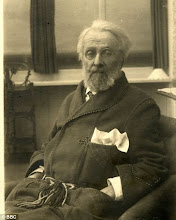The Tories are threatening to create eight more local mayors of large towns if they win the next election. Ever the man to jump on a passing bandwagon, David Cameron, or, more likely, his advisors, have seized on the idea that what people want is apparently more involvement in local politics at a local level, with local decision making. He even thinks (or he says he thinks, which is not quite the same thing) that there should be local referendums on key issues affecting local communities.
The thing is, though, we already have perfectly adequate structures for local government, without the needless addition of extra tiers of bureaucracy. In fact, in a bold statement of Bolshy Party policy, I think we should get rid of the existing mayors we have already got, and go back to the more democratically accountable structures of council meetings that are open to the public and capable of being scrutinised.
In the areas where you have got mayors already, local government has morphed into a sort of mini-me version of national government, and decisions being taken by a closed “cabinet” of officials and advisors around the chief executive. Even some large county and metropolitan borough councils have adopted this strategy. This is the sort of thinking that led to councils investing our money in Icelandic dodgy banks without actually telling anyone until it was too late.
While it is all fine and dandy to encourage people to participate in local democracy, and I am all for local decisions being taken by local people using the established channels, gimmicks are not the way. By “gimmicks” I mean things like text voting and local referendums. I particularly think local referendums are a bad idea because inevitably they will be anti-democratic in that they will take away the power from the existing decision making process and people will vote from the standpoint of a narrow, self-interested viewpoint, without considering the wider picture. So a referendum that promises a cut in council tax in return for the council cutting its expenditure on, say, services to the homeless, would probably be a slam-dunk. In fact, I predict that the general pressure for such referendums would always be on that axis of “what can the council cut to bring down our council tax”.
And that is before you get to the stage of (for instance) BNP dominated councils staging local referendums on “should we send all the Muslims in our town home”. Or loopy would-be guardians of public morailty calling for referendums on stringing up paedophiles, paediatricians, pedaloes and pedometers Bad, bad, idea.
I am not denying that there are some cases where council tax is spent unwisely, but my point is that there are existing structures in place to deal with the business of holding a council to account, without inventing cockamamie new ones. The amount of council tax a local authority has to raise in any case, and the amount of wriggle room it has to take its own expenditure decisions anyway, is ultimately determined by the size of the grant it gets from central government, and if the Tories do get in next time, by some misfortune, this is hardly likely to increase, so the pressure to cut costs will already be on, before you start adding referendums to the mix.
If you really wanted to get local people interested in local politics again, one way of doing it would be to show them that local politics can work, and can have an effect. And that their actions can make a difference. And to educate them about the issues. Using the existing structures of local government, with no additional expenditure and no need to alter a system which has worked for over a century.
But of course that is not “new” or “sexy” and it doesn’t fit in with Dave being “down with the yoof, innit”.
So, unless we resist this idea, and point out just why it is so facile, we are going to be stuck with the consequences of a series of ill-judged, arbitrary local votes probably based on false premises and partial self-interested understanding of the issues, another kick in the teeth for the many public sector and council workers who do put in the effort, largely unappreciated and probably underpaid, to make sure our bins get emptied, our kids get taught, there is some sort of safety net for the unfortunate, and there are books on the shelves of the libraries.
Subscribe to:
Post Comments (Atom)


No comments:
Post a Comment